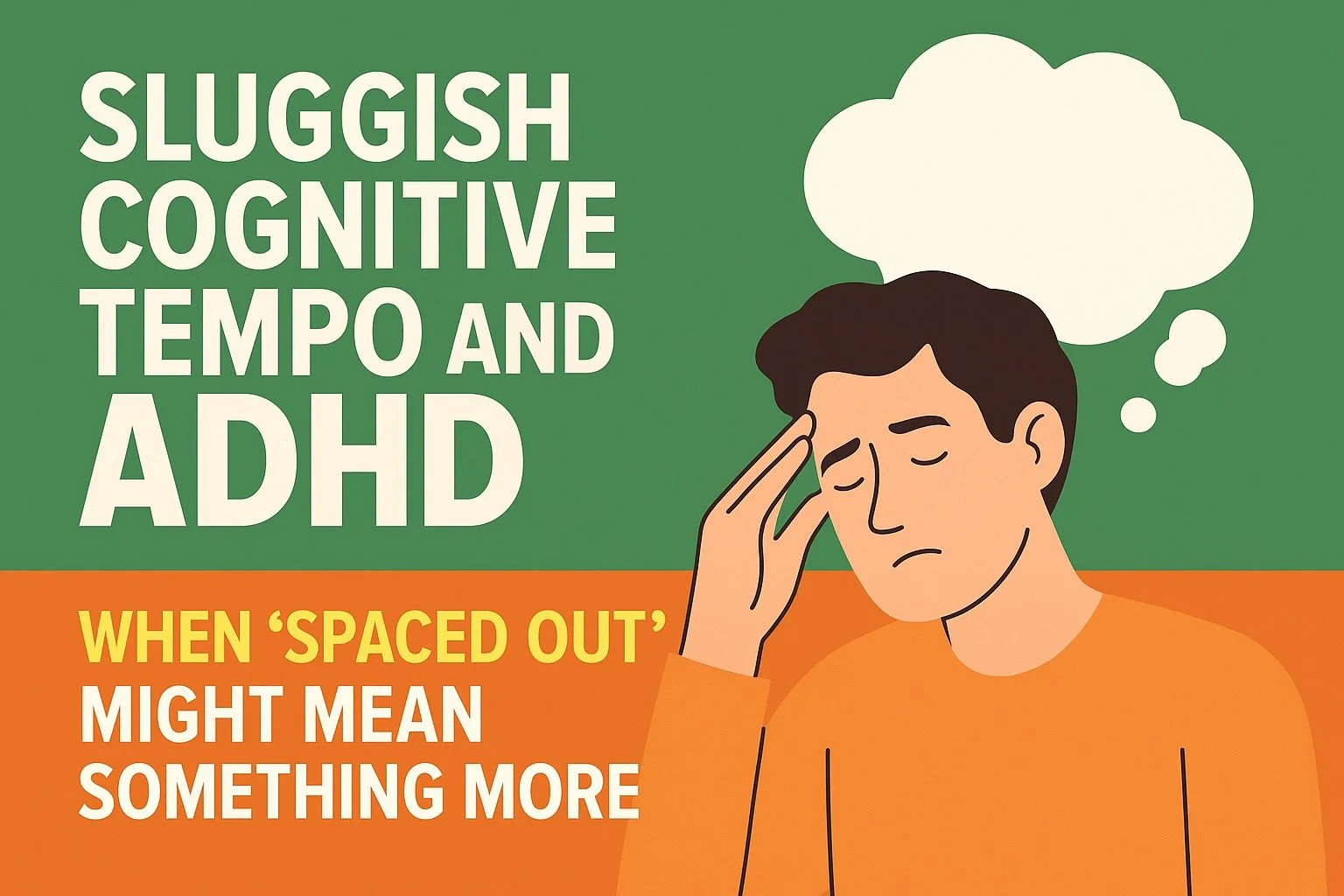ADHD Evaluation: When ‘Spaced Out’ Means More
Have you ever felt like your brain is running through molasses — slow to start, easy to lose track of what you were doing, or hard to shift into gear? Maybe you describe yourself as a “daydreamer” or “mentally foggy,” not the hyperactive stereotype of ADHD.
That pattern has a name: Sluggish Cognitive Tempo (SCT). It’s often overlooked, but for many adults, SCT overlaps with ADHD and can be a sign that a professional ADHD evaluation is worth pursuing.
What Is Sluggish Cognitive Tempo?
Sluggish Cognitive Tempo is a pattern of attention marked by slowed thinking, mental fogginess, frequent daydreaming, and trouble staying alert (Becker et al., 2016). Unlike hyperactivity or impulsivity, SCT tends to show up as internal distraction — you’re present, but your mind drifts.
Common experiences include:
Feeling mentally “stuck” or slow to respond
Getting lost in thought during conversations
Trouble initiating tasks or transitions
Forgetting mid-sentence what you wanted to say
SCT is not yet an official diagnosis in the DSM-5, but decades of research have identified it as a distinct cognitive profile that frequently co-occurs with ADHD-Inattentive type (Barkley, 2014).
How SCT Overlaps with ADHD
SCT and ADHD share several features: difficulties with sustained attention, processing speed, and executive function.
However, SCT tends to involve under-activation — a sluggish alertness — while classic ADHD often involves over-activation and impulsivity (Becker et al., 2023).
Research shows that about one-third of individuals with ADHD also meet criteria for SCT symptoms (Becker et al., 2020). These individuals often struggle with mental energy and motivation rather than restlessness.
Neurologically, both conditions involve differences in the brain’s attention networks and dopamine regulation — which explains why similar medications can sometimes help both (Barkley, 2014).
Why SCT Can Be Missed in Adults
Adults with SCT rarely get noticed for being disruptive; instead, they may be labeled “quiet,” “unmotivated,” or “lazy.” Because SCT doesn’t look like the stereotypical restless ADHD child, many adults internalize guilt or frustration instead of realizing there’s a neurological reason for their experience (Kamradt et al., 2022).
Symptoms are also easily confused with depression or anxiety: low energy, zoning out, and difficulty starting tasks can overlap with those conditions. That’s why a comprehensive ADHD evaluation is essential — it helps clarify whether SCT, ADHD, or another issue is driving the challenges.
Why an ADHD Evaluation Matters
An ADHD evaluation goes beyond checklists. It involves clinical interviews, standardized rating scales, and an exploration of how attention patterns affect your work, relationships, and daily functioning.
A high-quality evaluation can help you:
Understand whether ADHD or SCT best explains your symptoms
Rule out other causes such as mood or sleep disorders
Identify treatment options — both medication and behavioral
Without an evaluation, adults with SCT-type symptoms often assume they just need more discipline or motivation. In reality, the issue is neurobiological, and accurate diagnosis leads to real relief.
Treatment and Support Options
There’s no one-size-fits-all approach. Many adults benefit from the same strategies used in ADHD care:
Medication management: Stimulants or non-stimulants may improve alertness and task initiation for some individuals with SCT (Barkley, 2014).
Therapy: Cognitive-Behavioral Therapy (CBT) and coaching can build routines, improve self-confidence, and teach strategies to manage mental fatigue (Sprich et al., 2012).
Lifestyle: Sleep, exercise, and structure help counter sluggishness by supporting dopamine and energy regulation.
Working with a prescriber who takes time to fine-tune medications — not just refill them — is key.
When to Seek Professional Help in Oregon
If you see yourself in these descriptions — mentally slow, easily lost in thought, and frustrated by low energy — it might be time for an ADHD evaluation.
At Celium Healthcare, we specialize in helping adults across Portland and Oregon uncover the “why” behind their attention and motivation struggles.
Our clinicians provide:
Comprehensive ADHD evaluations for adults
Thoughtful, responsive medication management
Collaboration with therapists and other providers
Acceptance of Moda, PacificSource, Regence, BCBS, Samaritan, and Adventist Health PPO Plans
If you’ve been feeling foggy or slow for years and nothing seems to explain it, it’s worth getting clarity. An evaluation can be the first step toward understanding your brain — and finding the focus and energy you’ve been missing. Schedule an ADHD evaluation with Celium Healthcare today.
References
Barkley, R. A. (2014). Sluggish cognitive tempo (concentration deficit disorder): Current status, future directions, and a plea to change the name. Journal of Abnormal Child Psychology, 42(1), 117–125. https://doi.org/10.1007/s10802-013-9824-y
Becker, S. P., Willcutt, E. G., Leopold, D. R., Fredrick, J. W., Smith, Z. R., Jacobson, L. A., Burns, G. L., Mayes, S. D., Waschbusch, D. A., Froehlich, T. E., McBurnett, K., Servera, M., & Barkley, R. A. (2023). Report of a Work Group on Sluggish Cognitive Tempo: Key Research Directions and a Consensus Change in Terminology to Cognitive Disengagement Syndrome. Journal of the American Academy of Child and Adolescent Psychiatry, 62(6), 629–645. https://doi.org/10.1016/j.jaac.2022.07.821
Becker, S. P., Leopold, D. R., et al. (2016). The internal, external, and diagnostic validity of sluggish cognitive tempo: A meta-analysis. Psychological Bulletin, 142(12), 1375–1396. https://doi.org/10.1037/bul0000075
Kamradt, J. M., Eadeh, H. M., & Nikolas, M. A. (2022). Sluggish Cognitive Tempo as a Transdiagnostic Link Between Adult ADHD and Internalizing Symptoms. Journal of psychopathology and behavioral assessment, 44(3), 699–712. https://doi.org/10.1007/s10862-021-09926-8
Becker, S. P., Willcutt, E. G., et al. (2020). Attention-deficit/hyperactivity disorder and sluggish cognitive tempo: A review of distinct yet overlapping constructs. Clinical Psychology Review, 81, 101905. https://doi.org/10.1016/j.cpr.2020.101905
Sprich, S. E., Knouse, L. E., Cooper-Vince, C., Burbridge, J., & Safren, S. A. (2012). Description and Demonstration of CBT for ADHD in Adults. Cognitive and behavioral practice, 17(1), 10.1016/j.cbpra.2009.09.002. https://doi.org/10.1016/j.cbpra.2009.09.002

